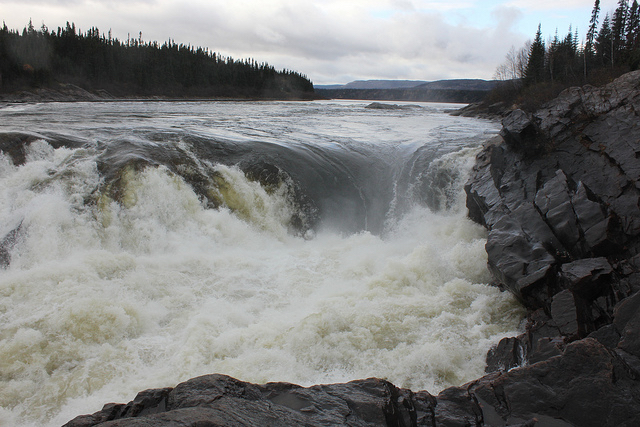The Trudeau government should honour its commitment to the UN Declaration on the Rights of Indigenous Peoples and stop Muskrat Falls, said Maude Barlow, Council of Canadians chairperson.
Protesters have long been rallying against the Muskrat Falls hydro project, afraid that the flooding as part of the dam and powerhouse construction may contaminate fish and other wild foods with methylmercury and effect Indigenous communities who rely on the fish and seal meat.
The resulting reservoir would expand over an area of about 41 square kilometres near Happy Valley-Goose Bay.
Continuous protests that started on Saturday are asking Nalcor, a provincial energy corporation which is headquartered in St. John’s, Newfoundland and Labrador, to reconsider their plan to flood the reservoir at the hydroelectric project site.
“The flooding of the Muskrat Falls reservoir over protest of locals may be violating a UN declaration Canada only agreed to last May. Barlow says the relationship between governments and the rights of indigenous people to their lands has changed even since the beginning of the Muskrat Falls project, and that moving ahead in this way may have international legal implications,” VOCM reported. “She says as recently as last May the Trudeau government agreed to the UN’s Declaration on the Rights of Indigenous People which requires prior informed consent before anything like the flooding of the area this can go ahead.”
“When the Innu and Inuit oppose something like Muskrat Falls we oppose it with them,” said Barlow.
Article 19 of the UN declaration highlights the importance of receiving free, prior and informed consent before adopting and implementing legislative or administrative measures that may affect Indigenous peoples.
The declaration also notes that Indigenous peoples have the “right to the conservation and protection of the environment and the productive capacity of their lands or territories” and “the right to maintain and strengthen their distinctive spiritual relationship with their traditionally owned or otherwise occupied and used lands.”
The Muskrat Falls project violates all three of these rights.
APTN reported that the Federal Fisheries Minister Dominic LeBlanc is considering a request for a review of a federal permit issued for the the Muskrat Falls project. The network reported that Yvonne Jones, parliamentary secretary of Indigenous affairs said she recently asked LeBlanc to review the issuing of the federal permit by his department to Nalcor, the Newfoundland and Labrador Crown corporation behind the dam.
The Muskrat Falls hydroelectric dam project would see two large dams, a 32 metre high north dam and a 29 metre south dam, on the lower Churchill River in Labrador.
The dams are being built on Innu lands and would severely impact Inuit peoples.
In 2012, the federal government provided a loan guarantee of $6.4 billion to enable the project to proceed. It also removed federal oversight of the Churchill River in their Navigation Protection Act.
The parliamentary secretary of Indigenous affairs says she expects a response from the federal Fisheries Minister within the next few days. His answer will need to come soon.
Yesterday afternoon, officials began the impoundment of the Muskrat Falls dam reservoir with water levels now expected to rise by about half a metre to one metre a day. The water levels will rise to 39 metres by 2019. If not stopped, the dam will flood 41 square kilometres and establish a 100 square kilometre reservoir.
The Council of Canadians has stated that the federal and provincial government can only proceed with the flooding once Indigenous peoples have their given free, prior and informed consent.
We have long supported the endorsement and implementation of the UN Declaration on the Rights of Indigenous People, which also has major implications for the Alton Gas Storage Project, the Pacific NorthWest LNG terminal, the Site C dam, and the Energy East and Trans Mountain pipelines.
While the Trudeau government promised to implement the declaration in May, by July federal Justice Minister Jody Wilson-Raybould said it was “unworkable” to incorporate it into Canadian law.
Like this article? rabble is reader-supported journalism. Chip in to keep stories like these coming.



